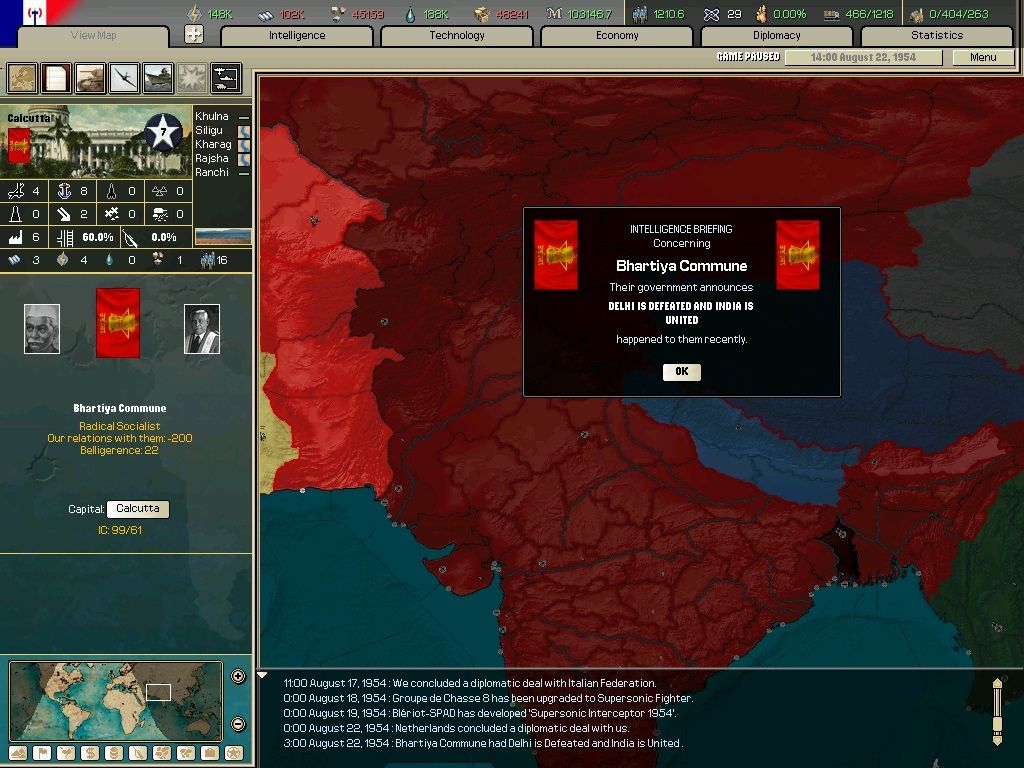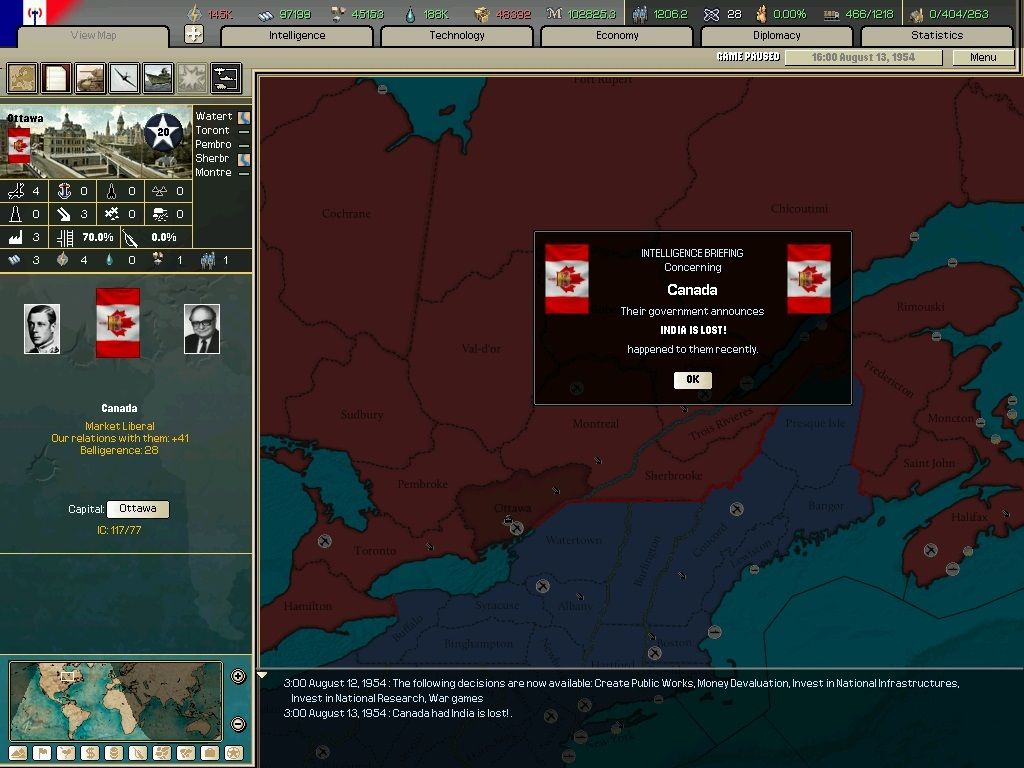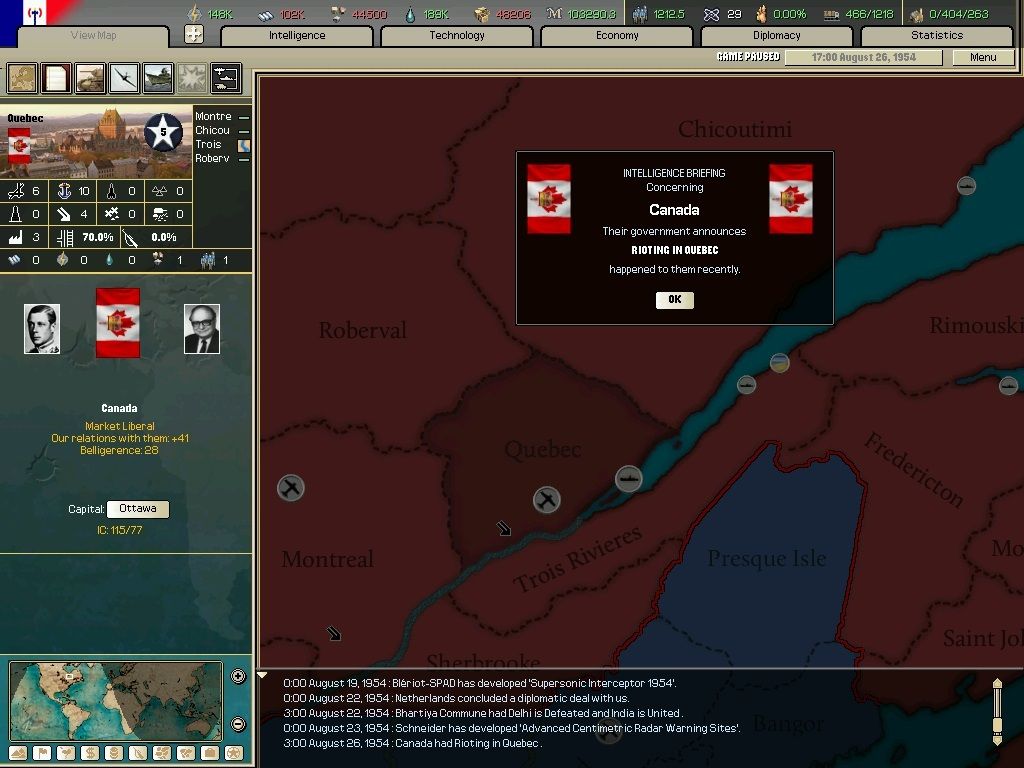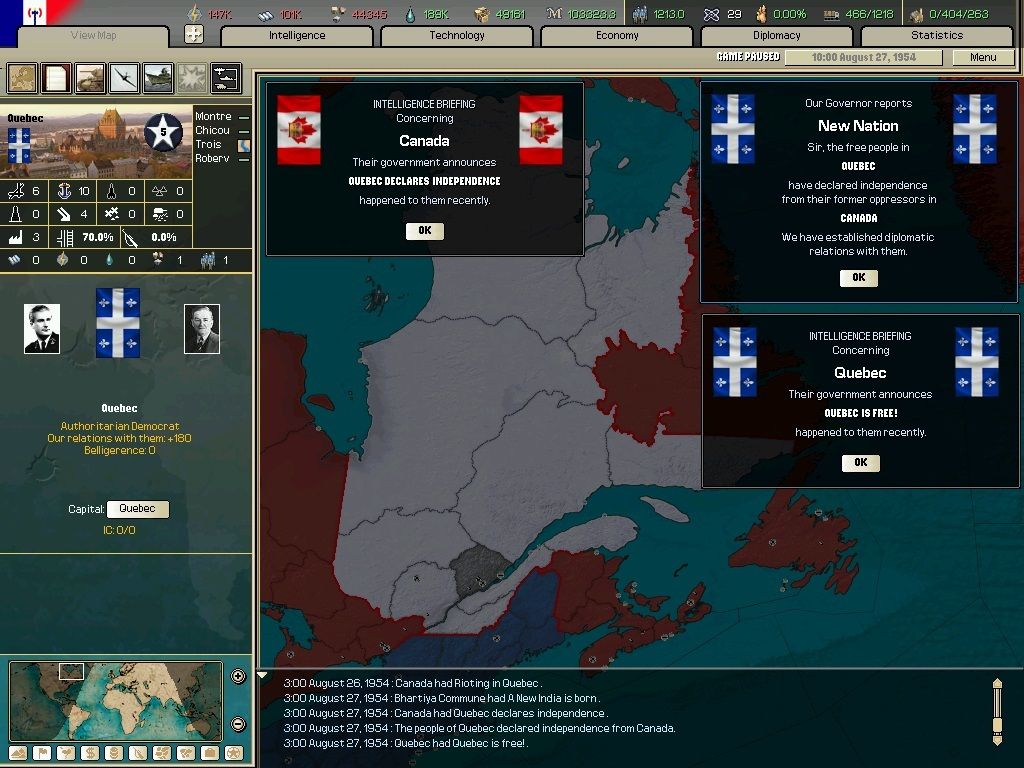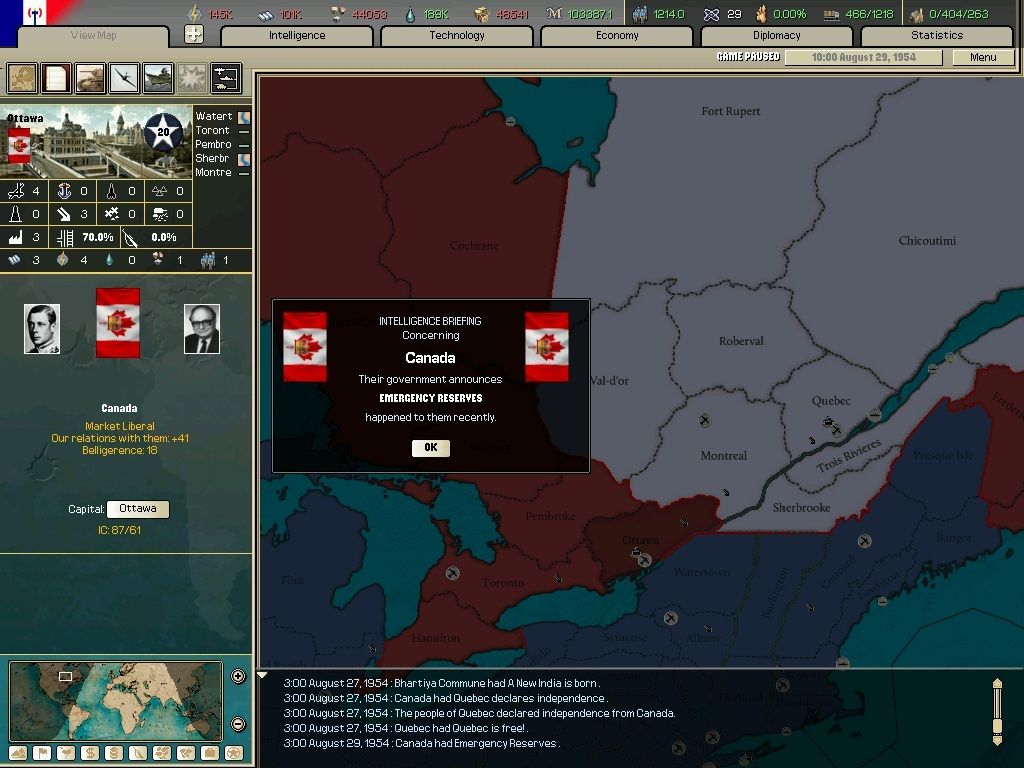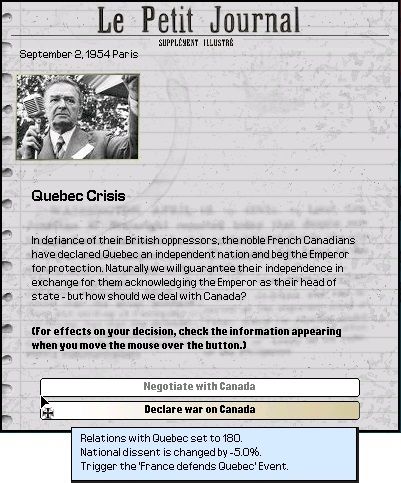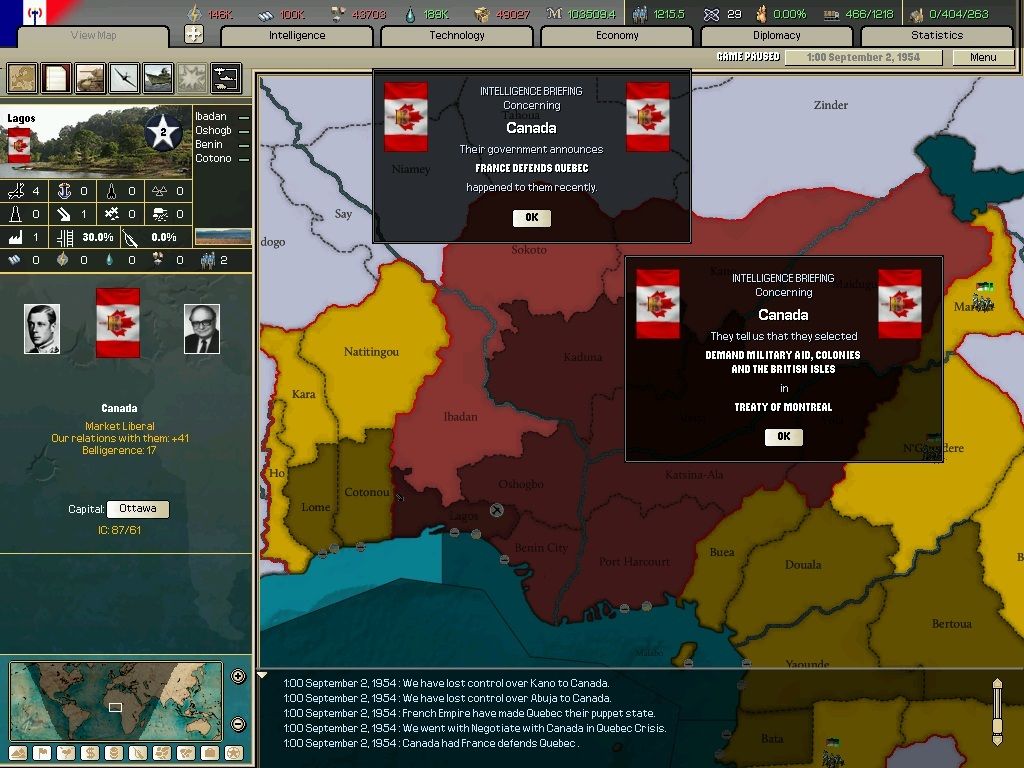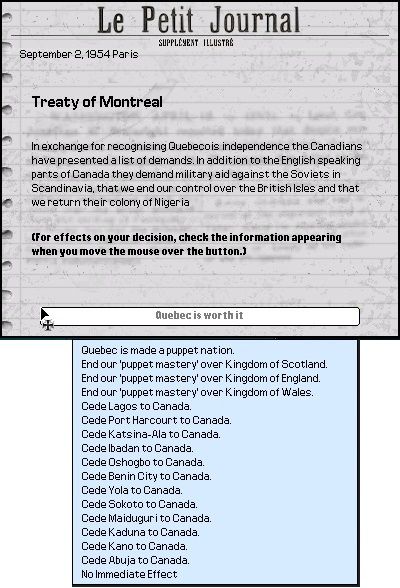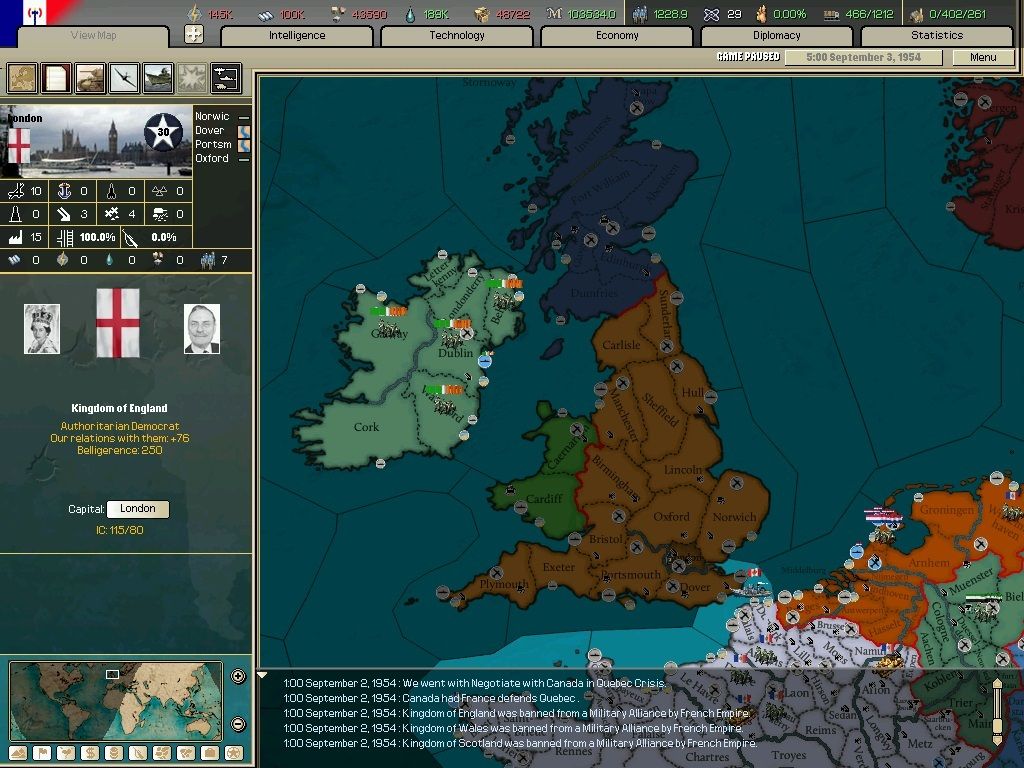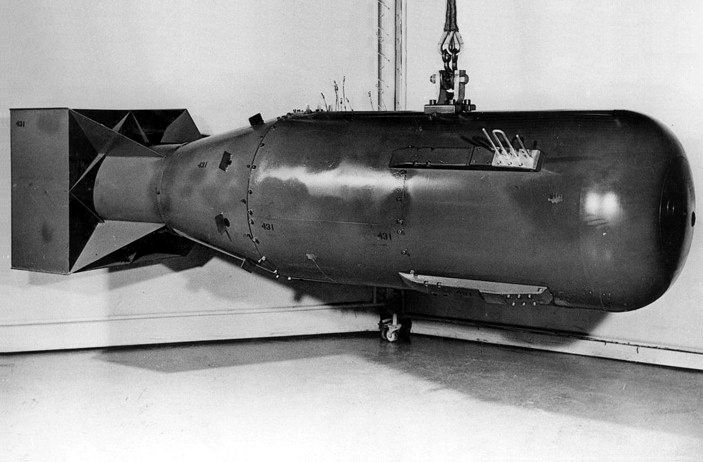Vive L'Empereur: The Third French Empire - a National France Kaiserreich AAR
- Thread starter Antonine
- Start date
-
We have updated our Community Code of Conduct. Please read through the new rules for the forum that are an integral part of Paradox Interactive’s User Agreement.
You are using an out of date browser. It may not display this or other websites correctly.
You should upgrade or use an alternative browser.
You should upgrade or use an alternative browser.
- Status
- Not open for further replies.
The Quebec Crisis has its origins in Asia and this update is just the build up to it - the next update will show how it gets its name.
Oh my, what did they do with Mongolia? Change it into puppet regime with effective control only in national capital? And that Red alliance looks really mighty, seems like there is a clash of Titans coming soon...
The US is something I keep meaning to get round to. I'll probably fix it in the next bunch of events I need to create.
They're not really the type for military adventurism anymore though so I expect that Mexico will still hang on to California.
They're not really the type for military adventurism anymore though so I expect that Mexico will still hang on to California.
Oh my, what did they do with Mongolia? Change it into puppet regime with effective control only in national capital? And that Red alliance looks really mighty, seems like there is a clash of Titans coming soon...
Yup, pretty much. They later gave back Xinjiang though - presumably because they couldn't be bothered to occupy it themselves.
Well if Im seeing correct, it Tutchachevsky's path, the Totalist one, gives you massive claims/cores in comparison to even the Syndical "USSR" option
Well if Im seeing correct, it Tutchachevsky's path, the Totalist one, gives you massive claims/cores in comparison to even the Syndical "USSR" option
All of Russia's paths give you massive claims and cores, that one must be crazy to get special mention.
Mind you, Red Russia is probably in need of dire overhaul at some point, since the content is way old. But yes, taking the option "Tuchachevsky takes power, world revolution begins!" gives you claims even on Poland, and swathes of other land. 
I think even taking the regular USSR option gives you claims on Mongolia, hence when Mongolia folded as his puppet, the land went to USSR, which is an obvious disconnect between intended consequences. But alas, Red Russia is still rare in most games. Russia is OP in general with KR because it started out as a Russiastronk mod.
I think even taking the regular USSR option gives you claims on Mongolia, hence when Mongolia folded as his puppet, the land went to USSR, which is an obvious disconnect between intended consequences. But alas, Red Russia is still rare in most games. Russia is OP in general with KR because it started out as a Russiastronk mod.
Actually IconOfEvi, the Soviet claims have been changed slightly. The event to determine who rules the Soviets is now a seperate event. Even "worse" than Poland is it gives you claims on Finland, but you can claim any province you currently want.
Well tbh I haven't played them in 1.6, but Russia in general is still a giant mess. And yes, they are still way way too OP. I mean, getting an aircraft carrier out of seizing a big ship in Vladivostok? Come on. Events that drive them to massive expand relatively cost free? Well either way, doesn't seem to be affecting my game, Russia just seems stuck in a rut.
I will freely admit that I helped Russia a little with events. A couple of declarations of war and them regaining German occupied Russia were down to me. Plus the eventual Bharitya-Soviet alliance (because Bharitya not taking the opportunity to unite India was implausible). The rest of it was all the AI though - I even dragged Mongolia into the war against the Soviets to try and balance things out.
But the world would be pretty boring if there wasn't a powerful ideological counterweight to the League though so I'm happy with my meddling overall
But the world would be pretty boring if there wasn't a powerful ideological counterweight to the League though so I'm happy with my meddling overall
So you were going to get another update tonight (one which @General_Hoth will love) but I just noticed that the third Hobbit film's on netflix so I've left it half finished for now. I've got all the screenshots though so, fingers crossed, I'll get it finished tomorrow instead 
Still love this AAR I death. Post-war is looking even more interesting than the actual war. Love the Syndie Russia and India, not enough KR AARs have post-war syndicalism at all.
Can,t waitSo you were going to get another update tonight (one which @General_Hoth will love) but I just noticed that the third Hobbit film's on netflix so I've left it half finished for now. I've got all the screenshots though so, fingers crossed, I'll get it finished tomorrow instead
The Quebec Crisis: Part II
While the Entente collapse in Eurasia was worrying in its own right, especially to those who bordered the new red giant, the immediate political consequences in Canada were even more severe and were what gave the whole sequence of events the name of the Quebec Crisis.
When the news that India was lost reached Ottawa even the best censorship and propaganda couldn’t mask the scale of the disaster. A long, bloody war against the Soviets which had claimed the lives of thousands of Canadian conscripts had failed to stop the red menace and had even cost the Entente the remnants of the British Raj.
Public morale fell dramatically and small protests over the conduct of the war broke out across Canada. But it was in Quebec that matters would come to a head. In the French speaking province French Canadians had long resented being forced to fight and die in British wars and sporadic riots had occurred periodically throughout the period since the federal government had introduced conscription.
But now the provincial government, led by Premier Duplessis and controlled by his fearsome political machine the Union Nationale (UN), itself came out to lead the protests against conscription. Duplessis had already formally protested about its introduction and now the political giant declared that it was an evil that had cost the lives of far too many Quebecois and insisted that it either be repealed or the provincial government would do all in its power to obstruct it.
As rioting broke out in support of his words with many English speaking Canadian businesses being attacked, the federal government made the decision to arrest Duplessis on charges of treason and sedition.
However, when a detachment of the Royal Mounted Police was sent to arrest Duplessis they found their way blocked by armed members of the UN. The standoff ended in gunfire with each side blaming the other. As the RMP withdrew and news of the attempted arrest spread, mass demonstrations against the federal government broke out and on the evening of the 26th of August Duplessis gave a speech to a demonstration in Quebec City where he declared the independence of Quebec and its allegiance to Napoleon IV while appealing to the Emperor to defend the new nation’s independence.
Such was the control of the political machine Duplessis had built that the provincial government remained totally under his control and acted overnight, along with UN members, to take control of all federal institutions and military installations in Quebec.
By the morning of the 27th the Canadian government in Ottawa found itself only a mile from a unilaterally declared border defended by armed militia and Quebecois veterans while the bulk of the Canadian military was fighting against the Soviets overseas.
In an emergency session of parliament, one boycotted by many Quebecois MPs, the emergency reserves were called up and the government was given far sweeping powers in order to crush what official propaganda described as a “rebellion by Soviet funded traitors”.
By this point news of Duplessis’ plea for protection had reached Paris and Napoleon IV summoned the cabinet for immediate discussion of how to react.
That France would defend French speakers who had pledged their loyalty and take the opportunity to regain French Canada after centuries of separation was a foregone conclusion. What the debate turned to was how the protection of Quebec could best be achieved.
Some, such as De Gaulle, favoured a war against Canada to enforce the independence of Quebec, confident in the army and atomic arsenal of France and its ability to break the remnants of the British Empire once and for all.
Others, particularly Admiral D’Argenlieu, were in favour of negotiations with Canada from a position of strength due to their awareness that the Royal Navy remained larger than the French Navy and would be able to delay the arrival of French troops in Quebec long enough for the Canadians to occupy it and potentially lay waste to the province if they thought they were going to lose the war.
In the end Napoleon IV made the final decision and sided with D’Argenlieu (something De Gaulle would later take as a personal slight) and announced his guarantee of the independence of Quebec but suggested a conference in Montreal to negotiate with Canada over the matter.
Faced with the prospect of a war of attrition with an atomic armed opponent with far greater industrial capacity and the ability to sever Canada from the forces fighting in Scandinavia, the government in Ottawa was forced reluctantly to accept the independence of Quebec and negotiations in Montreal. However, it was also equally aware that it would be able to crush and execute the regime in Quebec before French aid arrived and that military defeat on the part of Canada would allow the Soviets to regain control of Scandinavia - something which no nation in the League would welcome.
Therefore Crawford Macpherson, the Prime Minister of Canada, sought to use the negotiations to extract the highest price possible for accepting the fait accompli of Quebecois independence.
When the Montreal conference opened the Canadian diplomats proceeded to play a bad hand extremely well, and focused their demands in three key areas: the end of French control over the British Isles, the return of former British colonies and secret military aid against the Soviets.
After weeks of negotiations, the French and the Canadians agreed on terms in a treaty which would see the return of largely English speaking Nigeria to Canada (the French refused point blank to return other former British colonies under their control), Canadian recognition of Quebec’s independence with Napoleon IV as its head of state, a Canadian right of access through Quebec to the maritime provinces and Newfoundland, and a declaration by France that they would not seek to influence or intervene in any political or diplomatic events in the British Isles.
This last element in particular was, on the part of France, effectively ending its control over the governments of Scotland, Wales and England (though French control over the English government had by now been rendered a fiction by Enoch Powell anyway) and included the dissolution of all military obligations between France and its now former puppet governments. The British Isles were now a geopolitical vacuum which Canada would be allowed to fill - if it could.
But, most significantly, a secret annex to the Montreal Agreement included promises by France to support Canada against the Soviets by transferring, literally in the dead of night, two technologically obsolescent but still functional atomic bombs from the French arsenal to a Royal Air Force strategic bomber wing based in Copenhagen. A deadly showdown between the Soviets and the west was now inevitable.
While the Entente collapse in Eurasia was worrying in its own right, especially to those who bordered the new red giant, the immediate political consequences in Canada were even more severe and were what gave the whole sequence of events the name of the Quebec Crisis.
When the news that India was lost reached Ottawa even the best censorship and propaganda couldn’t mask the scale of the disaster. A long, bloody war against the Soviets which had claimed the lives of thousands of Canadian conscripts had failed to stop the red menace and had even cost the Entente the remnants of the British Raj.
Public morale fell dramatically and small protests over the conduct of the war broke out across Canada. But it was in Quebec that matters would come to a head. In the French speaking province French Canadians had long resented being forced to fight and die in British wars and sporadic riots had occurred periodically throughout the period since the federal government had introduced conscription.
But now the provincial government, led by Premier Duplessis and controlled by his fearsome political machine the Union Nationale (UN), itself came out to lead the protests against conscription. Duplessis had already formally protested about its introduction and now the political giant declared that it was an evil that had cost the lives of far too many Quebecois and insisted that it either be repealed or the provincial government would do all in its power to obstruct it.
As rioting broke out in support of his words with many English speaking Canadian businesses being attacked, the federal government made the decision to arrest Duplessis on charges of treason and sedition.
However, when a detachment of the Royal Mounted Police was sent to arrest Duplessis they found their way blocked by armed members of the UN. The standoff ended in gunfire with each side blaming the other. As the RMP withdrew and news of the attempted arrest spread, mass demonstrations against the federal government broke out and on the evening of the 26th of August Duplessis gave a speech to a demonstration in Quebec City where he declared the independence of Quebec and its allegiance to Napoleon IV while appealing to the Emperor to defend the new nation’s independence.
Such was the control of the political machine Duplessis had built that the provincial government remained totally under his control and acted overnight, along with UN members, to take control of all federal institutions and military installations in Quebec.
By the morning of the 27th the Canadian government in Ottawa found itself only a mile from a unilaterally declared border defended by armed militia and Quebecois veterans while the bulk of the Canadian military was fighting against the Soviets overseas.
In an emergency session of parliament, one boycotted by many Quebecois MPs, the emergency reserves were called up and the government was given far sweeping powers in order to crush what official propaganda described as a “rebellion by Soviet funded traitors”.
By this point news of Duplessis’ plea for protection had reached Paris and Napoleon IV summoned the cabinet for immediate discussion of how to react.
That France would defend French speakers who had pledged their loyalty and take the opportunity to regain French Canada after centuries of separation was a foregone conclusion. What the debate turned to was how the protection of Quebec could best be achieved.
Some, such as De Gaulle, favoured a war against Canada to enforce the independence of Quebec, confident in the army and atomic arsenal of France and its ability to break the remnants of the British Empire once and for all.
Others, particularly Admiral D’Argenlieu, were in favour of negotiations with Canada from a position of strength due to their awareness that the Royal Navy remained larger than the French Navy and would be able to delay the arrival of French troops in Quebec long enough for the Canadians to occupy it and potentially lay waste to the province if they thought they were going to lose the war.
In the end Napoleon IV made the final decision and sided with D’Argenlieu (something De Gaulle would later take as a personal slight) and announced his guarantee of the independence of Quebec but suggested a conference in Montreal to negotiate with Canada over the matter.
Faced with the prospect of a war of attrition with an atomic armed opponent with far greater industrial capacity and the ability to sever Canada from the forces fighting in Scandinavia, the government in Ottawa was forced reluctantly to accept the independence of Quebec and negotiations in Montreal. However, it was also equally aware that it would be able to crush and execute the regime in Quebec before French aid arrived and that military defeat on the part of Canada would allow the Soviets to regain control of Scandinavia - something which no nation in the League would welcome.
Therefore Crawford Macpherson, the Prime Minister of Canada, sought to use the negotiations to extract the highest price possible for accepting the fait accompli of Quebecois independence.
When the Montreal conference opened the Canadian diplomats proceeded to play a bad hand extremely well, and focused their demands in three key areas: the end of French control over the British Isles, the return of former British colonies and secret military aid against the Soviets.
After weeks of negotiations, the French and the Canadians agreed on terms in a treaty which would see the return of largely English speaking Nigeria to Canada (the French refused point blank to return other former British colonies under their control), Canadian recognition of Quebec’s independence with Napoleon IV as its head of state, a Canadian right of access through Quebec to the maritime provinces and Newfoundland, and a declaration by France that they would not seek to influence or intervene in any political or diplomatic events in the British Isles.
This last element in particular was, on the part of France, effectively ending its control over the governments of Scotland, Wales and England (though French control over the English government had by now been rendered a fiction by Enoch Powell anyway) and included the dissolution of all military obligations between France and its now former puppet governments. The British Isles were now a geopolitical vacuum which Canada would be allowed to fill - if it could.
But, most significantly, a secret annex to the Montreal Agreement included promises by France to support Canada against the Soviets by transferring, literally in the dead of night, two technologically obsolescent but still functional atomic bombs from the French arsenal to a Royal Air Force strategic bomber wing based in Copenhagen. A deadly showdown between the Soviets and the west was now inevitable.
Last edited:
- 1
Whoa.
A neat way to play out the Quebec crisis. Although it sucks to see Canada get split in two, at least Canada got Nigeria, the British Isles, and a couple of Atom bombs from it. Over time, I hope this may lead to some sort of reconciliation between the Entente and the French, who together would make a powerful alliance.
Great update!
A neat way to play out the Quebec crisis. Although it sucks to see Canada get split in two, at least Canada got Nigeria, the British Isles, and a couple of Atom bombs from it. Over time, I hope this may lead to some sort of reconciliation between the Entente and the French, who together would make a powerful alliance.
Great update!
- Status
- Not open for further replies.


